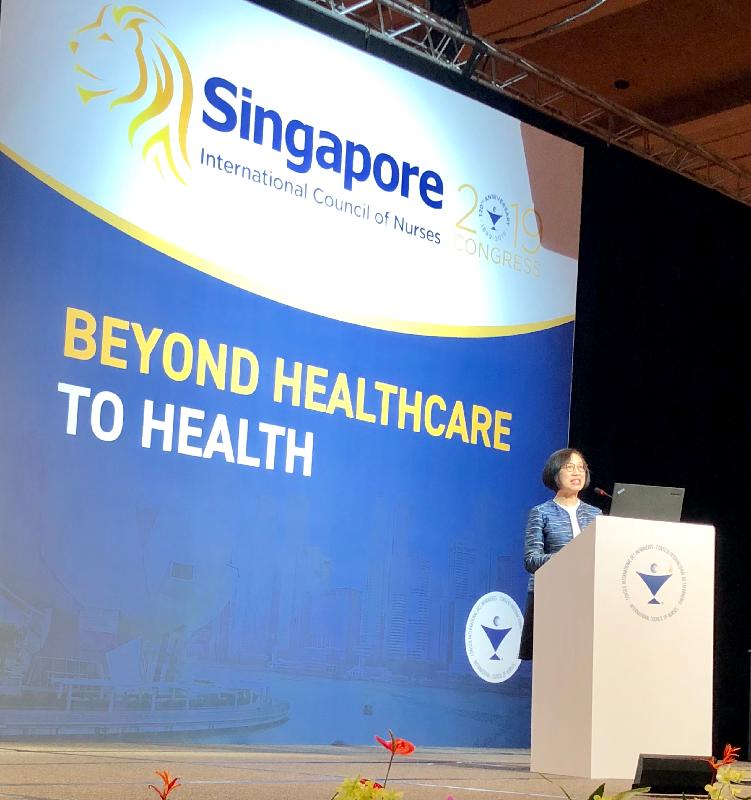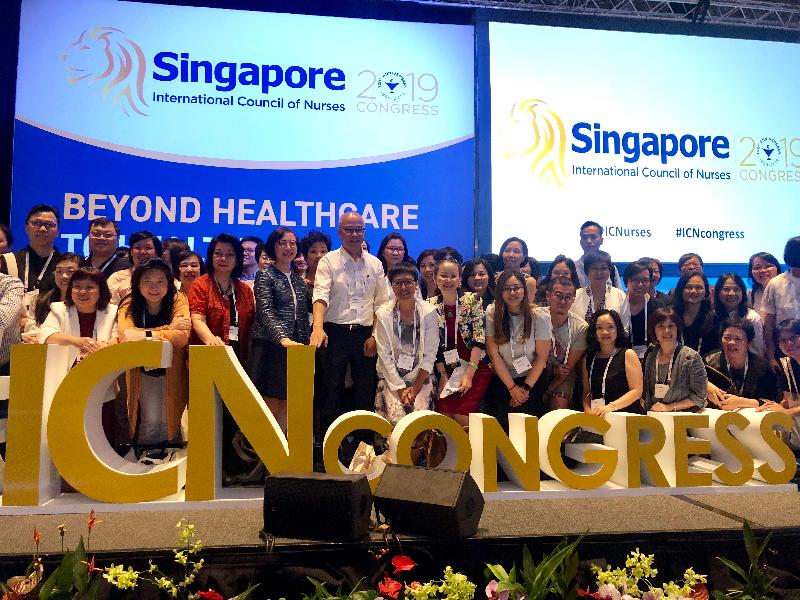Speech by SFH at International Council of Nurses Congress (English only) (with photos)
**************************************************************************************
Distinguished guests, friends and colleagues, ladies and gentlemen,
Good afternoon.
I would like to briefly explain the work of the Food and Health Bureau of the HKSAR. The Food and Health Bureau is firmly committed to promoting and protecting the health of all citizens in Hong Kong. We also endeavour to enhance food safety and provide quality environmental hygiene. The Government attaches great importance to the prevention of non-communicable diseases, including tobacco control.
The Government launched in May 2018 "Towards 2025: Strategy and Action Plan to Prevent and Control Non-communicable Diseases in Hong Kong", with nine local targets to be achieved by 2025 in order to reduce the burden of non-communicable diseases in Hong Kong.
The Tobacco and Alcohol Control Office of the Department of Health was established in 2001. It is responsible for implementing and enforcing the tobacco control legislation, particularly the smoking ban in statutory no smoking areas. Apart from law enforcement, the priority functions of the Tobacco and Alcohol Control Office also include promoting a smoke-free culture and enhancing compliance with the Smoking (Public Health) Ordinance through publicity and health education and co-ordinating the smoking cessation services.
To protect public health, it is the established policy of the Government to discourage smoking, contain the proliferation of tobacco use and protect the public from exposure to second-hand smoke as far as possible. To this end, the Government adopts a progressive and multi-pronged approach comprising legislation, enforcement, publicity, education, smoking cessation and taxation. Our current policy on tobacco control has full regard to the provisions of World Health Organization (WHO) Framework Convention of Tobacco Control (FCTC).
With the progressive implementation of tobacco control measures and the efforts made by different sectors of the community over the past three decades, the proportion of daily smokers among the population aged 15 and above dropped with steady steps from about 23.3 per cent in 1982 to 10.0 per cent in 2017. The smoking prevalence in Hong Kong is among the lowest in the Western Pacific region. As you can see from the table, we have implemented various tobacco control initiatives over the years, including expanding no smoking areas, increasing tobacco duty, prohibiting tobacco advertisement, etc. This would not be achievable without the help from different sectors of the community.
I understand most of the people working in the tobacco control field have heard about the MPOWER. In gist, MPOWER is a policy package intended to assist in the country-level implementation of effective interventions to reduce the demand for tobacco, as ratified by WHO FCTC. The six most effective policies that can curb the tobacco epidemic are outlined in WHO's MPOWER strategy:
- Monitor tobacco use and prevention polices
- Protect people from tobacco smoke
- Offer help to quit tobacco use
- Warn about the dangers of tobacco
- Enforce bans on tobacco advertising, promotion and sponsorship
- Raise taxes on tobacco
First of all, let us take a look on how Hong Kong monitors the use of tobacco among local population.
To monitor tobacco use, the Hong Kong Census and Statistics Department has regularly conducted a population-based THS (Thematic Household Survey) to track the trend and pattern of smoking since 1982. The latest survey was conducted in 2017. For each round of survey, some 10 000 households would be selected and all persons aged 15 and above within this household would be interviewed. As mentioned earlier, the daily cigarette smoking prevalence is on a decreasing trend over the past decades from 23.3 per cent in 1982 to 10.0 per cent in 2017.
The letter "P" in the MPOWER measure is to protect people from tobacco smoke.
Starting from January 1, 2007, smoking is banned in all indoor areas of workplaces and public places in Hong Kong, including restaurants and bars, as well as outdoor areas of schools, public pleasure grounds, beaches, public transport facilities, etc, in phases.
Recently the smoking ban has been extended to bus interchanges. Non-smokers waiting and queuing for changing buses at bus interchanges would not be able to take effective measures against second-hand smoke if smoking is allowed. To protect the health of passengers, we extended the smoking ban to bus interchanges located at tunnel portal areas and leading to expressways or tunnel areas since 2016.
With the enactment of the Fixed Penalty (Smoking Offences) Ordinance in 2009, persons smoking in statutory no smoking areas and on public transport carriers are liable to a fixed penalty of HK$1,500.
Another MPOWER measure is to offer help to quit tobacco use.
Smoking cessation is an integral and indispensable part of the Government's tobacco control policy to complement other tobacco control measures. The Department of Health operates an integrated Smoking Cessation Hotline to handle general enquiries and provide professional counselling and information on smoking cessation, and arrange referrals to various smoking cessation services in Hong Kong, including public clinics under the Department of Health and the Hospital Authority, as well as community-based cessation programmes operated by NGOs.
The Tobacco and Alcohol Control Office was designated by the WHO to set up the Collaborating Centre for Smoking Cessation and Treatment of Tobacco Dependence in Hong Kong in April 2012. The Centre aims to provide evidence-based smoking cessation training for healthcare personnel; develop, test and evaluate models of smoking cessation; and assist WHO in the dissemination of information and good practices on smoking cessation.
The next measure is to warn about the dangers of tobacco. The measures that we adopted in Hong Kong are the pictorial health warning on the cigarettes packets, as well as implementing publicity and health education.
The amendment order which seeks to expand the coverage of health warnings on the packets of tobacco products from 50 per cent to 85 per cent came into effect on December 21, 2017, and into full effect on June 21, 2018. The number of forms of health warning also increased from six to 12.
We endeavour to enhance the awareness of the general public on the harmfulness of smoking, to prevent people, especially younger people, from picking up the smoking habit. The Department of Health subvents the Hong Kong Council on Smoking and Health to carry out publicity and education programmes, such as health talks, training programmes, theatre programmes, etc, in schools to raise awareness on smoking hazards, including the use of alternative smoking products. The Department of Health also collaborates with NGOs in organising health promotional activities at schools. The programmes aim to enlighten students to discern marketing tactics used by the tobacco industry, and equip them with skills to resist picking up the smoking habit because of peer pressure through interactive teaching materials and mobile classrooms.
The letter "E" represents enforcing bans on tobacco advertising, promotion and sponsorship.
In Hong Kong all advertisements and promotions on tobacco products are now prohibited. The ban covers all tobacco advertisement in TV, radio, films, Internet, as well as printed media or retailers. Besides, the promotion of tobacco products, for example, giving free samples of tobacco products, giving a tobacco product as a prize or giving valuable consideration to induce an individual to buy tobacco products, are also prohibited.
The last MPOWER measure is to raise the tobacco tax, which is considered by the WHO as the single most cost effective way to reduce tobacco use.
Tobacco duty increase is long established and part and parcel of our multi-pronged approach to tobacco control. Over the years, tobacco duty has been increased progressively in tandem with the strengthening of overall tobacco control. The duty on tobacco products was last increased by about 41.5 per cent and about 11.7 per cent in 2011 and 2014 respectively to tie in with our tobacco control measures.
Now, I would like to talk about our future goals.
To safeguard our public health, we hope to bring down the smoking prevalence further to below 10 per cent. Under "Towards 2025: Strategy and Action Plan to Prevent and Control Non-communicable Diseases in Hong Kong", the Government has also laid down the target of further reduction smoking prevalence to 7.8 per cent by 2025, to meet the WHO NCD target.
Last but not least, I would like to share our new proposed legislative amendment to ban alternative smoking products, including e-cigarettes, heat-not-burn products and herbal cigarettes.
The emergence of alternative smoking products has posed new health risks and challenges. Often packaged as less harmful substitutes with promotion tactics targeted at youngsters and non-smokers, these products open a gateway to the eventual consumption of conventional cigarettes. The fact is: all these new smoking products are harmful to health and produce second-hand smoke. There is also a lack of sufficient evidence to prove that these products can help quit smoking. Instead, there are studies that suggested that the introduction of these new products could result in dual use with conventional cigarettes. The public may underestimate the harmful effects of these products and eventually endorse the smoking image and relevant behaviours once again. There is increasing evidence that both e-cigarettes and heat-not-burn products are definitely harmful to health and may bring about gateway effects. Overall, protecting public health should be the Government's prime consideration. We must ensure that our achievements in tobacco control over the years would not be undermined, and must prevent the harm of new products from taking root. With this in mind, the Chief Executive announced in the Policy Address 2018 the legislative amendment proposal to ban the import, manufacture, sale, distribution and advertisement of alternative smoking products. The Smoking (Public Health) (Amendment) Bill 2019 was introduced into the Legislative Council in February 2019. Details of the Bill are currently being scrutinised by the Bills Committee.
Thank you very much.
Ends/Friday, June 28, 2019
Issued at HKT 16:50
Issued at HKT 16:50
NNNN




